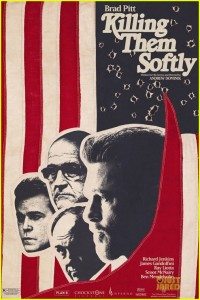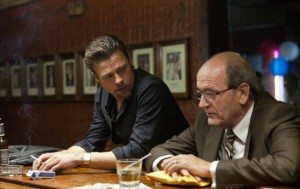 Is it possible for a film to be obtuse and heavy-handed simultaneously?
Is it possible for a film to be obtuse and heavy-handed simultaneously?
Hold that thought. Let’s consider.
I just came back from Andrew Dominik‘s third feature, Killing Them Softly, starring Brad Pitt, Scoot McNairy (who was awesome in Monsters), and a bunch of other literally heavy hitting actors: Ray Liotta, James Gandolfini, Sam Shepard, and, uh, Richard Jenkins. (I guess, in a fight, I’d try and take Richard Jenkins. Still. Great actor.) The only woman in the cast? A hooker.
Right off the bat—if you’re walking in expecting something along the lines of The Assassination of Jesse James by the Coward Robert Ford—you’re going to wonder if you’re in the right theater. I did. The opening of Killing Them Softly is jarring. Intentionally so. Musically and visually and through direct reference we’re excreted right into the 2008 election. Into the financial meltdown. We’re thrown in with the garbage.
Like that most-excellent of films, Shampoo, Killing Them Softly uses the election as a backdrop.
But while in Hal Ashby’s masterpiece, Warren Beatty’s George Roundy remains oblivious to the real choices before him—seemingly unaware of Nixon, the election, or anything farther away than his dreams and lusts—in Dominik’s film, the election is everywhere. Billboards loom. No matter where we are, or whom we’re with, the news is on and it’s playing some unedited speech. Hit men in muscle cars listen to George Bush’s version of oration. Wise guys in a poker den? Let’s listen to Bernake talk about financial markets.
 As if to say, from the start: “Hey. Schmuck. What we’re doing here—although it may appear to be a story about gangsters and murderers—is really about the economic crisis and American politics.”
As if to say, from the start: “Hey. Schmuck. What we’re doing here—although it may appear to be a story about gangsters and murderers—is really about the economic crisis and American politics.”
That’s okay. Except, given that frame, I feel obliged to translate the parable. So if Jenkins is the federal government and Liotta is the banking industry then is Scoot McNairy the American public? And what does Brad Pitt represent? Capitalism?
Never mind! People are getting shot and beaten—and that’s also not subtle. Dominik’s exaggerated sound and jaggedly intimate camerawork convey nothing so much as pure brutality. Shocking, visceral, lacerating. So much so that the woman next to me screamed aloud a few times.
 In between this violence, we get haze. Soft focus streets slick with rain. Faces indistinct in middle-distance miasma. If I hadn’t known it was a digital print, I would have thought it was out of focus. It was; it is. That’s how it was shot. Misty with moments of extreme clarity.
In between this violence, we get haze. Soft focus streets slick with rain. Faces indistinct in middle-distance miasma. If I hadn’t known it was a digital print, I would have thought it was out of focus. It was; it is. That’s how it was shot. Misty with moments of extreme clarity.
So back and forth I go, between watching Brad Pitt put the screws on the world and trying to figure out the symbolism, never really sinking into either immersion or understanding.
And that’s a shame. Because without the heavy-handed cutaways to Obama’s talking head and whatever economist going on in the background—making sure I didn’t miss that this was all saying something deep—I might have gotten into Killing Them Softly. Or at least more than I did.
There was an awful lot of talking. Much of it crude. A lot of it seemingly pointless and dull.
 There were also some stunningly enthralling sequences: the card game stick up, an auto-based assassination, and others. Quiet scenes—such as Gandolfini’s deteriorating hit man, drunk and cornered by his own actions—got their hands on your lapels and hung on on occasion as well.
There were also some stunningly enthralling sequences: the card game stick up, an auto-based assassination, and others. Quiet scenes—such as Gandolfini’s deteriorating hit man, drunk and cornered by his own actions—got their hands on your lapels and hung on on occasion as well.
And then, in the end, Brad Pitt tells us what it’s all about. The ending worked, but I felt disrespected. Dominik dared me to figure it out and then didn’t give me a chance.
Killing Them Softly ended up feeling like one of those story problems you got on standardized tests, where the trick was figuring out which pieces of information you needed to solve the question.
I guess I didn’t pass the test. I’m not sure if that failure is mine.

This came out in the UK a couple of months ago and I went to see it then. It’s one of those movies that is really nicely made and has big time actors doing big time acting even when they’re trying to purposely underact.
The ideas are nice, I like how Ray Liotta has to get beaten/killed because of what people will think, it reminded me of how people in power have to resign because the papers/public are outraged over some bullshit thing and so a head has to roll. The whole allegory was just way too in your face though.
At the end there’s not really much to think about beyond the corners of the screen, it’s all there for your. So if you want to have a chat to a friend about the film… you end up saying.. well this is what it was about.. you both agree and then talk about something else.
Yep. I guess I felt there might be more to it until it was over and Brad Pitt said, “Here is a summary of the film you just watched.” Then I was like, “Why did I spend the whole movie trying to figure out something so simple?”
I guess I figured there must be more to it. But I was wrong.
But I didn’t hate it or anything. It just didn’t come together for me.
all there for you*